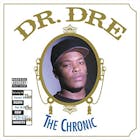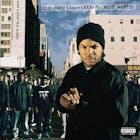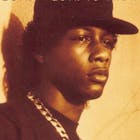
Classic Albums: 'No One Can Do It Better' by The D.O.C.
Classic Albums: 'No One Can Do It Better' by The D.O.C.
Published Mon, June 13, 2022 at 1:00 PM EDT
In 1989, Ruthless Records had reason to be cocky. The upstart label that turned "gangsta rap" into a household term was enjoying tremendous commercial success and infamy. "Supersonic" the bubbly pop rap hit by J.J. Fad had stormed the charts in 1988, an early victory for a label that was about to get a lot more notorious. N.W.A. dropped their album Straight Outta Compton that same year, becoming the most controversial act in music and selling over a million copies of their confrontational, vulgar, violent and groundbreaking masterwork.

But waiting in the wings this entire time was the label's secret weapon. Of course, the production ear of Andre "Dr. Dre" Young had been the catalyst for so much of the label's success; but so was the pen of a young emcee out of Dallas, TX. Tracy Curry had moved to Los Angeles in the hopes of becoming a rap star. In the mid-1980s, Dallas was exactly a place where Hip-Hop dreams thrived, so Curry set up shop in SoCal. When he was crashing on couches he came to meet a host of colorful characters, including a deejay named L.A. Dre who had a close friend named Suge Knight; and another guy who sold a little dope around the way and went by the name "Eazy."
As Eazy started putting a group together, he recruited The D.O.C., who'd been in a group called The Fila Fresh Crew, to rap. He brought in deejays Arabian Prince, Dr. Dre and DJ Yella, along with rhymers Ice Cube and eventually MC Ren. Eazy had a vision, and he launched his own label to produce his own records: Ruthless Records. But as Ruthless took off, and once manager Jerry Heller came into the picture; the D.O.C. felt increasingly marginalized by the group's fame. No one wanted the general public to know that it was D.O.C. writing so many of the rhymes that Dre and Eazy were making famous; and he would note that in media appearances, even when he was alongside N.W.A., he was encouraged to play the background.
But that all changed in 1989. Finally, The D.O.C. got to unleash his potential as a standalone artist. And his first single would be a monster. Armed with a sample of "Misdemeanor" by Foster Sylvers, The D.O.C. urged Dre to flip the early 70s soul hit into something hard-hitting. And on the track, D.O.C. simply goes to work. The result is one of the greatest singles in either man's career.
The D.O.C. said "It's Funky Enough" was the product of his own persistence.
"It took me about three fuckin’ months of begging him to make that beat before he finally made it," he told HipHopDX in 2012. "And those lyrics were actually meant for another song, but I didn’t have no words for that beat yet. So when I went in, I was just gonna lay something so he could finish adding the instrumental shit into the track. And when the beat came on, it just sounded Jamaican. So that’s the character that came out. And I just spit that shit. Muthafuckas kept motioning me to keep going, so I did. At the end of that I was like, “Well I can do it better.” Dre was like, “Fuck that! I’m not changing none of that shit.”
Dre's production skills in 1989 were moving past even what he'd done on Straight Outta Compton just one year before; the grooves were deeper, the polish was beginning to shine. Where ...Compton featured a decidedly West Coast spin on Bomb Squad-ish sound collages and aggression, No One Can Do It Better is inching closer to the sound Dre would become famous for in the 1990s.
DROP YOUR EMAIL
TO STAY IN THE KNOW
Without being saddled with N.W.A.'s sometimes cartoonish vulgarity and violence, The D.O.C. was left to indulge in his Hip-Hop jones. He flexed a gift for lyricism more associated with East Coast emcees like Rakim and KRS-One, and didn't curse anywhere near as much as his labelmates. Alongside Dr. Dre's ever-evolving production bonafides, The D.O.C.'s debut album had the versatility and the polish of a seasoned professional. As N.W.A. dominated the headlines with "F*ck the Police" and tour controversies, The D.O.C. shored up Ruthless as a Hip-Hop powerhouse with a debut that smashed expectations.
His influences could be heard plainly in the album's singles; from the faux-patois of "It's Funky Enough" to a decidedly b-boy-inflected flavor on fan favorite "The D.O.C. & The Doctor."
"I think that was my best Run [from Run-D.M.C.] impression," said The D.O.C. in 2012. "Run was my hero. And the 'diggy, diggy' thing came from him. So, it’s apropos that his son is named Diggy [Simmons]. And, I listened to young Diggy’s record and he’s got me all in it: from my raps to my cuts. So it’s all in the family. 'D.O.C. & The Doctor' was my best attempt to try to be Run. As an artist all I wanted to be was Run. When they did the movie Krush Groove and he got mad at his brother, and went on stage and he said 'It’s my muthafuckin’ house,' that was me. I was that nigga. … Well yeah, I do believe that 'The D.O.C. & The Doctor' was my strongest vocal performance...I put everything into that record."

That was my best Run impression. Run was my hero. And the 'diggy, diggy' thing came from him. So, it’s apropos that his son is named 'Diggy'..."
- The D.O.C. (HipHopDX, 2012)
For The D.O.C., the success of his debut album was more than enough reason to indulge in a superstar's lifestyle. His ego was suddenly out of control. “For a guy that came from nothing, where nobody expected anything of him, when [fame] happened, I wasn’t prepared for it," he told David Banner in 2020. "And it got the best of me, and I started really being sort of an egotistical guy, and tellin’ mothafuckas how cold I was, and tellin’ ’em I was ‘better than you.’ I’d walk in the studio with [N.W.A.] and be like, ‘Alright, now we can make records.'"
He dove headfirst into alcohol and weed, but also eventually dabbled in ecstasy and, ultimately, cocaine. He had all four substances in his system one night in November, after leaving a party in Beverly Hills, he hopped on the 101 freeway, drunk and high. He was pulled over by the police, but talked them out of a ticket and eventually posed for pictures with the officers. Just a few minutes later, his world would be changed forever.
"They let me go, fucked up," he recalled in 2020. "Thirty minutes later, I fell asleep behind the wheel and lost my voice. When I woke up, I couldn’t talk. It was just crushing."

I fell asleep behind the wheel and lost my voice. When I woke up, I couldn’t talk. It was just crushing."
- The D.O.C. (David Banner Podcast, 2020)
The aftermath of The D.O.C.'s accident saw him sink into deep depression as he came to grips with losing his voice. He also had to take a hard look at his relationship with Ruthless Records after the label began sending him bills for monies owed while he was still recuperating. He'd come up with Eazy-E, and now he was thinking that he might need to heed his old friend Suge Knight's advice and find his own thing.
"It was Eazy that would act up when Suge was with me, because nobody wanted to fuck with that dude," The D.O.C. recalled. "And if they did wanna fuck with him, then it would be on. I think Suge and I got kicked out of every [club] – no, not kicked out, we got banned from every fuckin’ club in Hollywood. We’d go in, I’d see some female, and then I’d go right up and slap her on her ass."
But now, Suge was telling him that Ruthless was fleecing him, and The D.O.C. had made no money from the songwriting he'd done on Straight Outta Compton, never mind No One Can Do It Better. Jerry Heller offered to pay for his therapy, but it just further angered The D.O.C.
"Where did he get all that money from? It had to come from somewhere. And to this day, I don’t own the publishing to any of those records. Not even from my own record. That’s sad but true. So if there’s anything I can do for today’s kids – especially the next muthafucka that’s as talented as I was – don’t live my life, nigga. It’s fucked up. Be better than me."
The D.O.C. would follow Ice Cube's lead away from Ruthless Records, and he'd convince Dr. Dre to come with him. They would depart their old friend's record label and sow the seeds to launch Death Row Records with Suge Knight and associate Dick Griffey. The D.O.C. would channel his frustration into ghostwriting for Dre and the producer's newest protege, a lanky Long Beach rapper named Snoop Doggy Dogg. The D.O.C. would eventually release a second album, 1996s Helter Skelter, but so much of his legacy centers around his brilliant debut.






